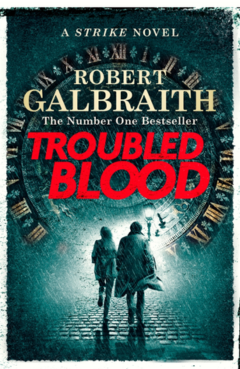Troubled Blood

Reading this was an odd experience. On the one hand I found the exhaustive description, lack of propulsion and proliferation of characters (and red herrings) irksome, but on the other I couldn’t put the daft thing down.
The problem is Rowling starts off well and has a knack of establishing characters and atmosphere that quickly suck you in, but seems to feel obliged to give her fans ever more of a good thing as her series progress - Harry Potter, anyone? The result is, in the case of this 5th book in the Cormoran Strike series, a ridiculously overlong book which would have benefitted from the editing out of many tedious and repetitive passages.
The thing is I’ve loved Strike and his sidekick, Robin Ellacott, since the Cuckoo’s Call, and I’m even more enamoured of the BBC adaptations of the books, so when Troubled Blood came on the TV recently I settled down to watch with pleasurable anticipation. Conceive of my dismay when I realised I hadn’t read the book – how did I miss it, must have been the pesky pandemic – so I series-linked the TV adaptation, got my hands on the door-stop of a book and prepared to batten down the hatches.
In this instalment Cormoran and Robin are trying to solve a cold case from the 70s involving serial killers, mafia gangsters, insane police officers and a veritable smorgasbord of suspects and bit players – so many that I defy any reader to keep track from one chapter to the next. I don’t mind a complicated plot but the stop-start feel of this narrative wore on my nerves. Particularly annoying were the unnecessary and banal descriptions of everything – people, places and things - the protagonists encountered. At one point they’re conducting an interview in a café with a suspect – at last getting somewhere - but Rowling keeps interrupting the narrative to describe 2 random girls sitting near them, oohing and aahing over their cakes, flirting with the waiter, etc.
Sorry Ms Rowling, it’s not necessary to use a sledgehammer to set a scene.
I also found the literal transcription of accents hard going, pages and pages of cockney complete with “I forts” and “wivs” had me grinding my teeth, though I did amuse myself reading out loud the dialogue of an Irish character (called Oonagh!) with all the mangled “ths”, etc. Nevertheless I was eager to find out who dunnit, convinced that there were clues cleverly embedded in the story and that it would all culminate in a satisfying big reveal.
Well Agatha Christie can rest easy, even Poirot would have struggled to untangle this mare’s nest, and if there were any clues they were buried too deep in the mess of extraneous detail to be of any use to this reader at least. But kudos to the BBC, its dramatization did put some shape on the story and the 2 lead actors were terrific as ever.












